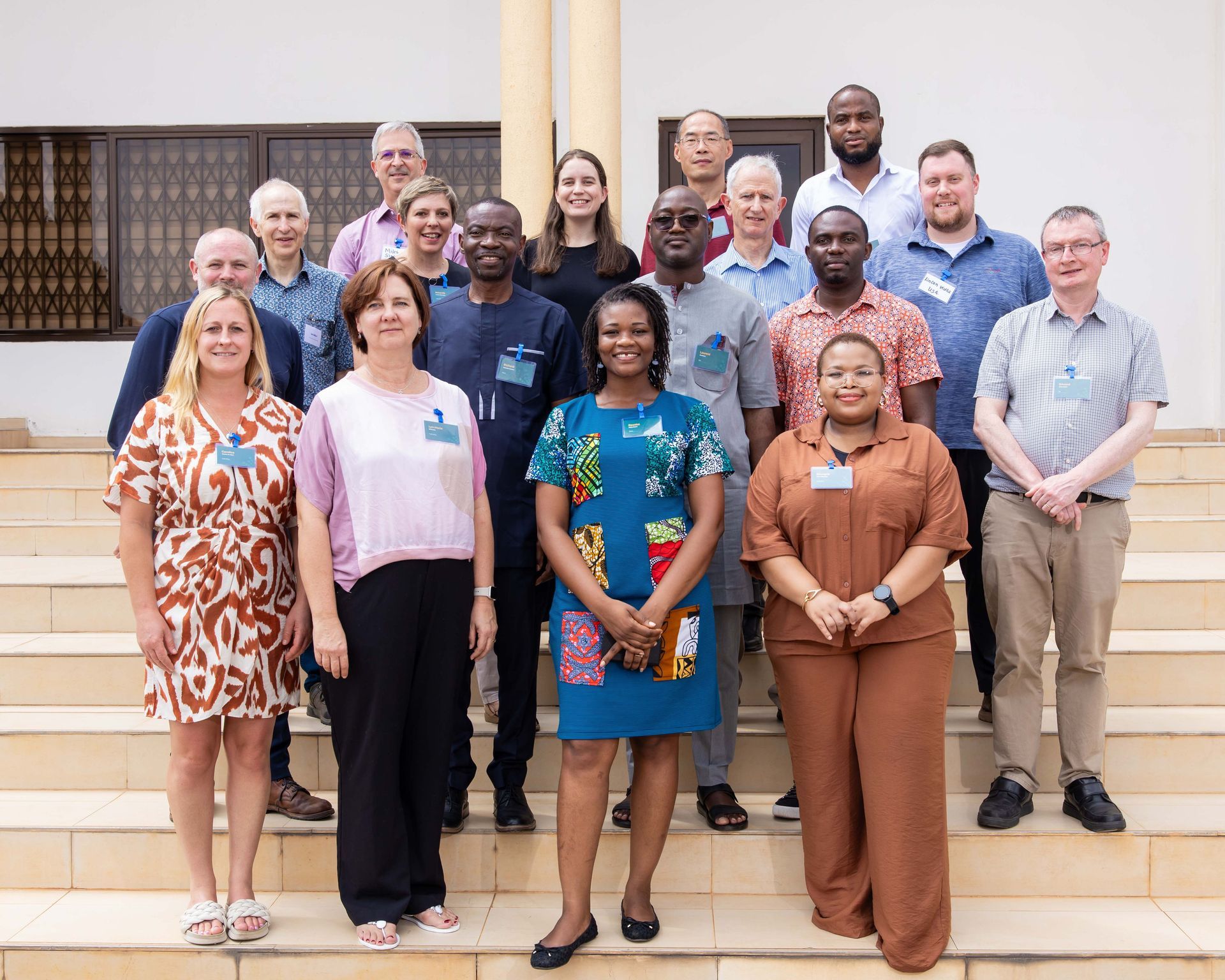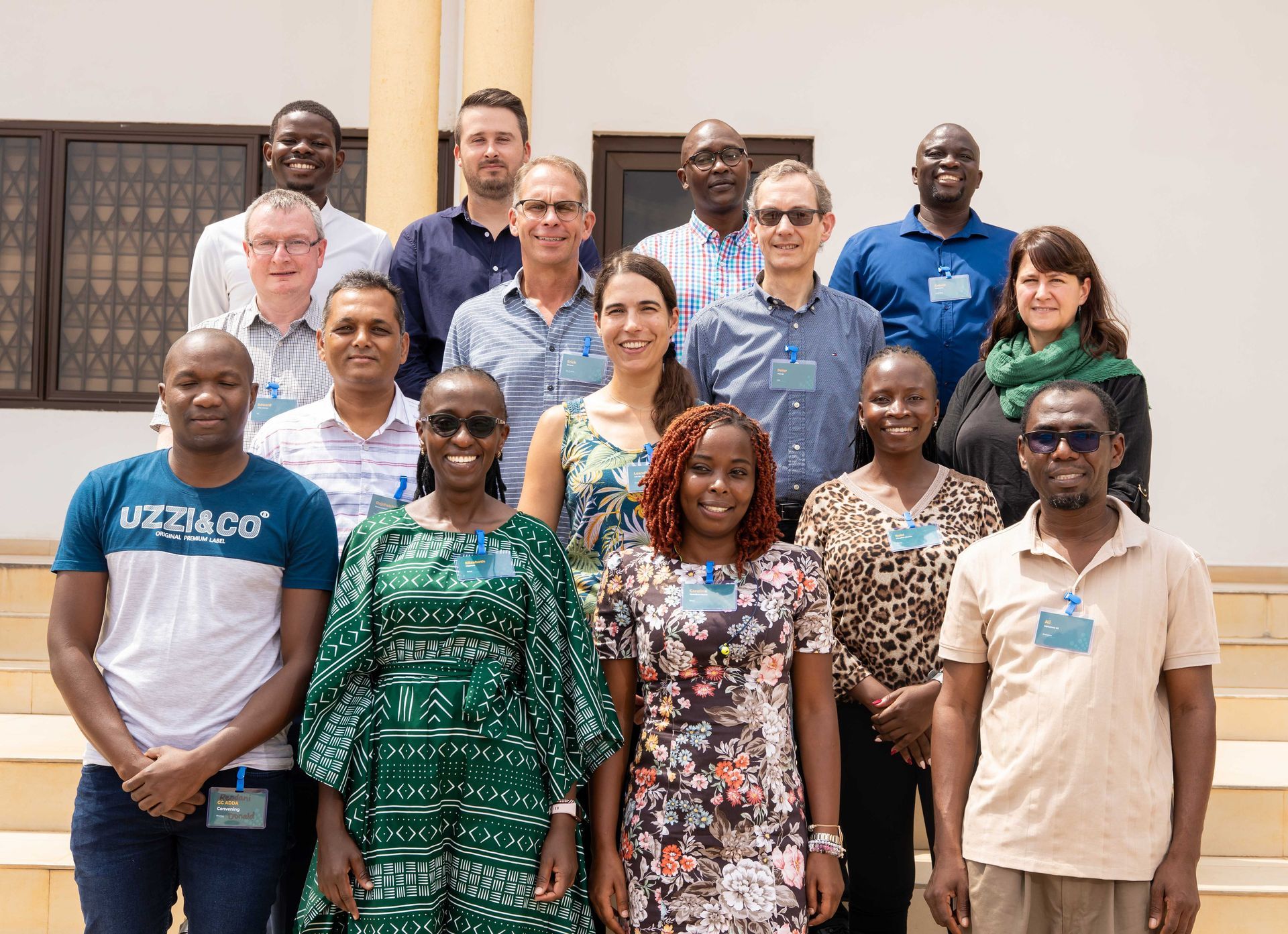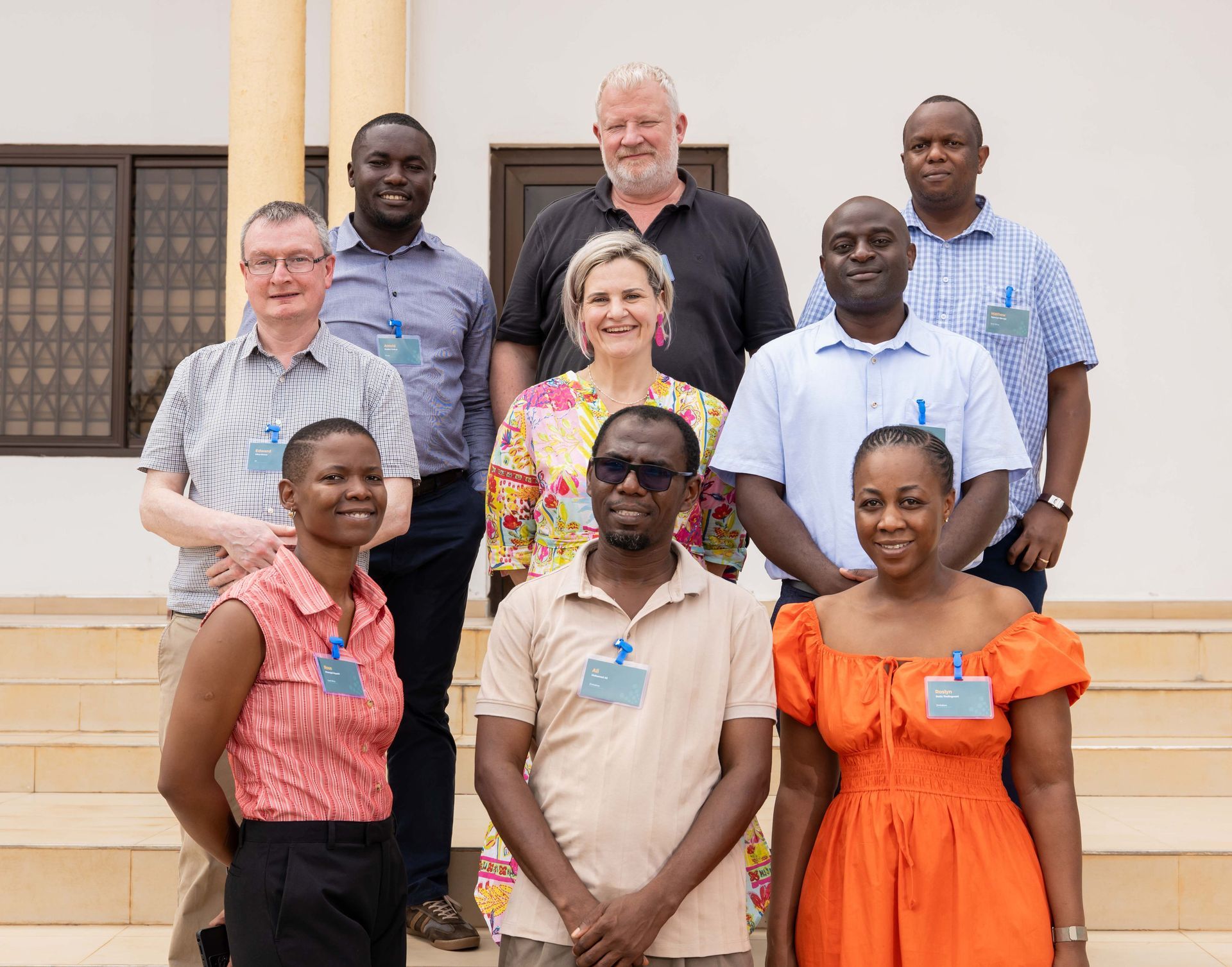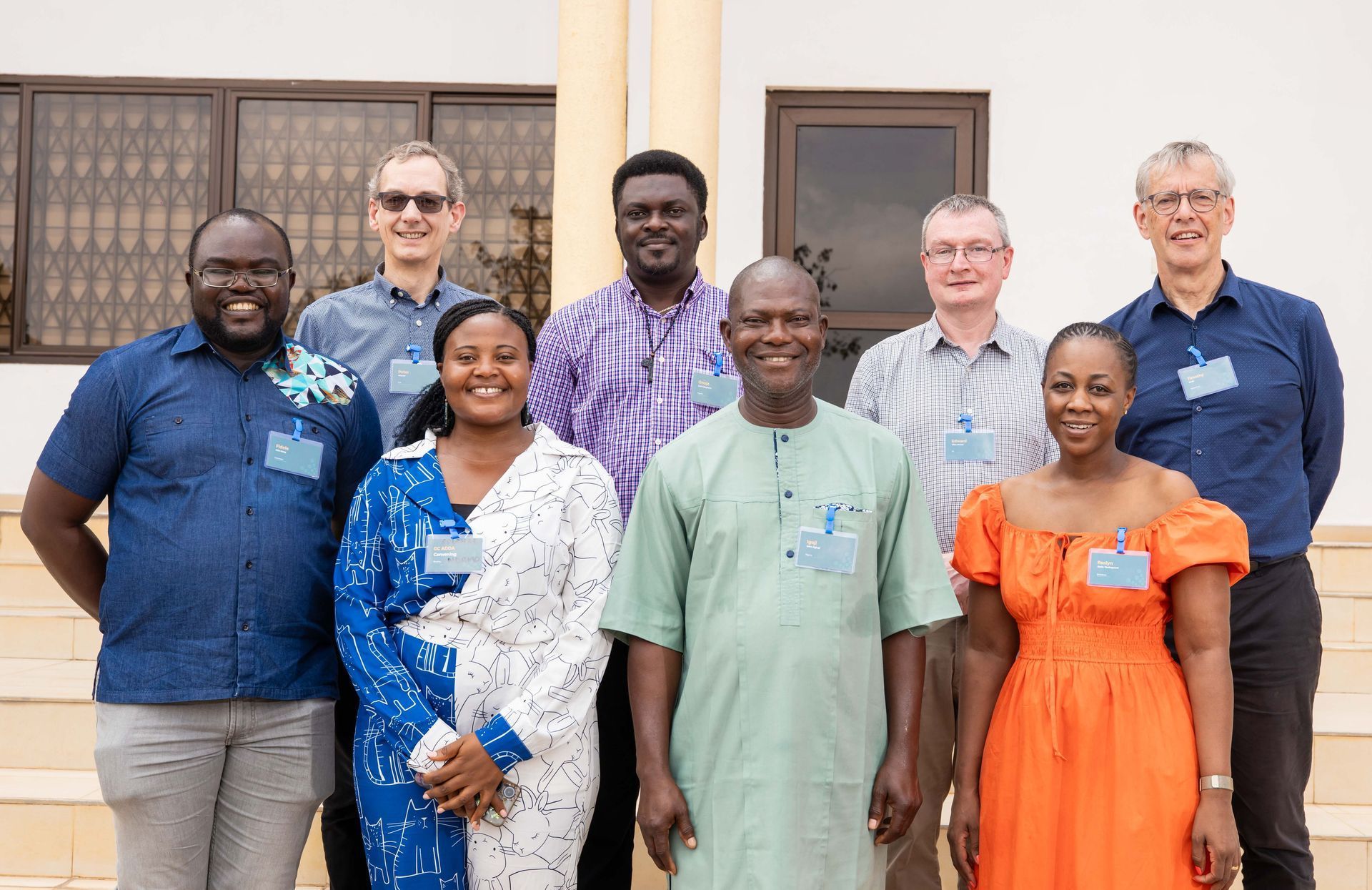PROJECTS
GC ADDA Flagship Projects
Grand Challenges African Drug Discovery Accelerator (GC ADDA) is a network of drug discovery researchers. The network originated through two Bill and Melinda Gates Foundation (BMGF) funding calls administered through Grand Challenges Africa: 8 mini-grants were awarded in 2019 and a further 8 mini-grants were awarded in 2021. In 2022/3 the programme managers agreed to put out a call for “Grand Challenges African Drug Discovery Accelerator” Flagship Projects and LifeArc came on board as a co-funder. In 2023, four 3-year grants and one 5-year grant collectively valued at $7.2 million were awarded.
GC ADDA Flagship Projects are GC ADDA Member Projects with the majority of funding coming from the GC ADDA seed funders: Gates Foundation and LifeArc.
01.Discovery of novel antimalarial lead candidates in Africa
PI Dr Richard Amewu, University of Ghana, Ghana, and Co-PI Prof Lyn-Marie Birkholtz, University of Pretoria, South Africa
About the project
The Discovery of Novel Antimalarial Lead Candidates in Africa Project, led by Prof. Richard Amewu (University of Ghana) and Prof. Lyn-Marie Birkholtz (University of Pretoria), is dedicated to discovering novel antimalarial lead compounds targeting low- and middle-income countries (LMICs) disproportionately affected by malaria. Jointly funded by the Bill & Melinda Gates Foundation and LifeArc, the project aims to identify a promising lead compound with dual-stage activity (asexual blood-stage and transmission-blocking) and strengthen synthetic and medicinal chemistry infrastructure across Africa.
Project contributors include Prof. Winston Nxumalo (University of Limpopo), Prof. Amanda Rousseau (University of the Witwatersrand), Prof. Fabrice Boyom (University of Yaoundé), Prof. Laurent Dembele, and Dr. Dinkorma Ouologuem (Université des Sciences, des Techniques et des Technologies de Bamako). DMPK support is provided by H3D at the University of Cape Town, South Africa, and AiBST, Zimbabwe.
Operating from Ghana, project manager Rawdat Awuku-Larbi supports the team with planning, sample and data management, and coordination, ensuring effective communication and alignment across research and administrative objectives.
The team’s multidisciplinary approach combines medicinal chemistry with in vitro biological assays to accelerate the discovery of effective antimalarial compounds. Beyond drug discovery, this collaboration builds African research capacity, fostering skills in drug development and malaria research. Ultimately, the project aims to establish an integrated antimalarial drug discovery accelerator platform in Africa, capable of advancing from hit discovery through lead optimization, positioning Africa at the forefront of sustainable solutions for malaria control and treatment.
Scientific Advisory Board:
- Gates Foundation Representatives: Gang Liu (& Lincoln Wallis from MalDA)
- LifeArc Representatives: Ed McIver, Clive Mason
- External Scientific Advisory Committee (ESAC) Members: Gang Liu, Greg Basarab, Ian Gilbert, James Duffy, David Powell
- Consultants (Lgenia): Miles Siegel
Photo caption:
Bottom row: Gang Liu, Fabrice Boyom, Richard Amewu, Lyn-Marie Birkholtz, James Duffy, Rawdat Awuku-Larbi, Laurent Dembele.
Top: Dinkorma Ouologuem, Ian Gilbert, Greg Basarab, Amanda Rousseau, Winston Nxumalo, Jessica Akester.

02.Pursuing Targeted Protein Degradation as a New Strategy for Antituberculosis Drug Development
PI Prof Erick Strauss, Stellenbosch University, South Africa
About the project
The current TB drug pipeline1 is populated with small molecule drug candidates that act through inhibition of essential protein activities (recently, the concept of vulnerability has replaced essentially as the main driver for target assessment2). However, the inhibitor-focused drug development approach suffers from several drawbacks, including difficulty in identification of targets amenable to small-molecule disruption, locating druggable sites that adversely impact target activity, and balancing inhibitor potency with potential selectivity and toxicity concerns to establish a therapeutic window.
We propose to address these challenges by pivoting to the development of proteolysis targeting chimeras (PROTACs) that reduce target levels by engaging the mycobacterial ClpCP protease, building on recent work that has shown targeted protein degradation (TPD) to be a viable strategy for anti-tuberculosis drug development3,4. We will develop small molecule bacterial PROTACs (BacPROTACs) to demonstrate proof of concept using two targets that capitalize on our teams’ experience, continuing to four high value targets selected based on various vulnerability and target-assessment criteria – all while performing parallel ADME/PK assessments of the molecules.
Photo caption: Site PIs and Co-PIs: Adrienne Edkins, Gabriel Mashabela, Erick Strauss, Konrad Mostert, Elizabeth Kigondu, Rajshekhar Kapoormath

03.Pan-African DMPK Centre of Excellence at the African Institute of Biomedical Science and Technology (AiBST)
PI Prof Collen Masimirembwa, African Institute for Biomedical Research, Zimbabwe) (5-year grant)
About the project
The Pan-African DMPK Centre of Excellence (DMPK-CoE) at AiBST has an overarching objective to build capacity for preclinical DMPK/ADME expertise in Africa and to support GC-ADDA early lead drug discovery projects. This is being achieved through setting up robust assays such as solubility, lipophilicity, protein binding, permeability and metabolic stability as standard screening assays. The DMPK-CoE is also responsible for the African DMPK Network (DMPK Africa) of scientists at different institutions, both in Africa and in the diaspora, with capabilities in specialized ADMET assays to support drug discovery & development with advanced assays such as enzyme identification, enzyme induction, enzyme inhibition, metabolite identification, drug transport, in vivo PK, toxicology, African liver tissue based metabolic characterization and pharmacogenetics.
The DMPK Africa provides a networking framework with international organizations in the field such as ISSX and DMDG. The DMPK-CoE is also responsible for building strength in DMPK through various training programs. In some aspects of DMPK, it is also addressing the global need to include people of African ancestry in the clinical evaluation of new chemical entities and the use of micro-physiological models that predict in vivo human DMPK, thus reduce the use of animals in such studies. Through these activities the DMPK-CoE at AiBST is building capacity to support the emerging drug discovery & development initiatives on the African continent.
Photo caption from left: Stanley Mukanganyama, Vincent Aketch, Fran Berlioz-Seux (BMGF), Collen Masimirembwa, Jenniffer Maroa (BMGF), Roslyn Thelingwani, and Catherine Jonhera.

04.Building a Natural Product Library
PI Prof Fidele Ntie-Kang, University of Buea, Cameroon
About the project
The goal is to create of a set of 400 African-derived natural products for screening against targets relevant to Global Health diseases, in particular, TB, NTDS, viral diseases, and malaria. We plan to curate and prepare a set of pure, diverse, and thoughtfully selected natural products from scientific publications to be included in the box. We will ensure that the samples of available compounds from African plants, fungal, marine and microbial sources that can be easily sourced and are not too expensive. The goal is to collect plant samples, prepare extracts and purified compounds from diverse sources in Cameroon as well as from other African sources.
The base of the initial collection is represented by natural products collections of already available samples in several collection points on the continent. To access these collections, consultancy agreements and subaward agreements with various universities in Ghana, Nigeria, Kenya, Tanzania, South Africa, and Cameroon have been signed. This ready to test set of about 400 pure compounds from African sources will be compounds with previously proven activities against different strains of malaria parasites as well as with proven in vitro antitubercular, antischistosomiasis, antileishmaniasis and anti-onchocercal activities. We also plan to make them available for screening in preparation for the next pandemic and to have them carry a computational evaluation of relevant PHYSCHEM and ADME properties.
Photo caption left to right: Clovis Sumbede Metuge, Fritz Mukow Nsanyi, Ariane Tirr Ndi, Fidele Ntie-Kang, Joel O. Onoja

05.Supporting the Grand Challenges African Drug Discovery Accelerator – led by H3D Foundation
PI Dr Susan Winks, H3D Foundation, South Africa
About the project
About the Project: Established to position Africa as a global player in innovative pharmaceutical R&D by strengthening infrastructure and the skills of scientists in Africa, the H3D Foundation and H3D Centre, University of Cape Town, have been the key strategic and technical partner for the Grand Challenges Africa Drug Discovery projects since inception. H3D Foundation will lead the formation of the GC ADDA network, which will work together to attract increased investment and strengthen the research infrastructure. The network will provide a framework for greater collaboration, shared training initiatives, and increased community engagement and public outreach. The other four projects will also receive technical support and training from the H3D Foundation and H3D Centre.
The key objectives of the project are to
1. Accelerate and support the Flagship GC ADDA projects to maximize success and impact.
2. Establish a sustainable Grand Challenges African Drug Discovery Accelerator network/community of practice involving at least 20 institutions across Africa actively working on drug discovery projects with quantifiable benefits including resource sharing, jointly securing additional funding and shared training programmes
Photo caption: Ms Nicola Elliott-Wong and Dr Susan Winks

GC ADDA Member Projects
A GC ADDA Member Project is a drug discovery project that is led (or co-led) by a GC ADDA member. The emphasis is on demonstrating scientific innovation and leadership in drug discovery out of Africa.
01.Host-virus interactions in KSHV-related malignancies: evaluating the role of STIP1 as a therapeutic target
PI: Adrienne Edkins, Rhodes University, RSA
Co-investigator (Co-I): Adrian Whitehouse, University of Leeds, UK
About the project
This is a target-based drug discovery project incorporating a chemical biology approach to identify new therapeutic approaches for KSHV-associated malignancies. Kaposi sarcoma associated herpesvirus (KSHV; also known as human herpesvirus 8/HHV8) is a virus classified as a type I carcinogen and linked to development of the tumour Kaposi’s sarcoma (KS) and two lymphoproliferative disorders, primary effusion lymphoma (PEL) And multicentric Castleman’s disease (MCD). These virally driven cancers are predominant in Africa because of naturally high KSHV seroprevalence. Most KSHV-associated malignancies arise in the context of immunosuppression, but there are also geographically restricted endemic subtypes which suggests a genetic contribution to the disease. Current therapies are not specific and largely restricted to reconstitution of the immune response, which can cause fatal side effects and is ineffective for the endemic subtype. Therefore, there is a significant incentive to identify targeted therapies to benefit African patients. By understanding susceptibility of host and viral processes to perturbation of cellular proteostasis, we aim to describe key nodes in viral replication and oncogenesis that can then be targeted for development of new and more effective treatments.
More information can be found at this link.
Photo caption: Elisa Kirigin, Lorraine Mutsvunguma, Michael Obinna Okpara, Jessica Watson, Jamie-Lee Ruck

Publications
Publication
Watch this space.
Publication
Watch this space.
Publication
Watch this space.

